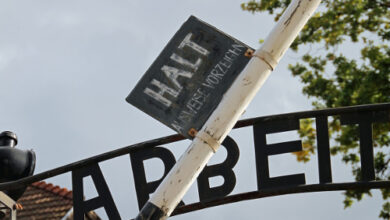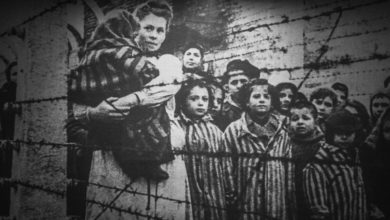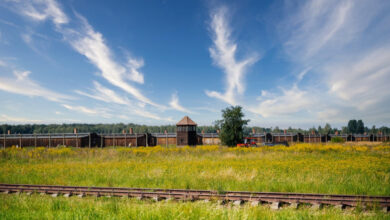The Nazi death camps (German: Konzentrationslager) created during the Second World War killed almost 9 million people. As a result, just in Auschwitz died 1,1 million prisoners. The camps’ aim was the extermination of Jews, Slavs, Gypsies and other non-Aryans. Some camps were to torture people to death and some of them directly murdered those who arrived at the place. Because Auschwitz was a special camp, its function was to force people to slave and starve. Before they died, they had to go through an ordeal.
The most recognisable sign of Auschwitz is the entrance – Auschwitz gate with the motto of the camp: Arbeit macht frei (English: work makes one free). In the short time this turned out to be the biggest lie in the history of Holocaust.
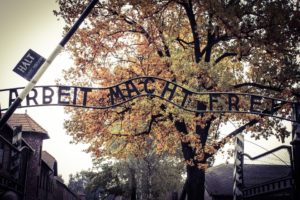
Table of Contents:
Whats the meaning of Auschwitz gate
Not just Auschwitz had the writing at the entrance. Nazis used this inscription above all as a motivation in many of their extermination camps. That is to say, people who have entered those places had more hope and could believe easier that their stay in this place is just temporary.
No one would believe then it’s going to be the place of death for many of people who were sentenced to work there. If not the outer circumstances, these are the faith and inner motivation to life that keep people alive and – what was crucial to Nazis – working.
Because Auschwitz gate’s function relied on playing with people’s most desire to stay alive and free. And Nazis didn’t care about whether it’s true or not. The end justifies the means – unfortunately we could all see they really followed this saying.
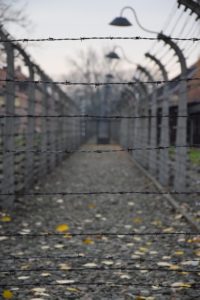
The origin of the Auschwitz gate
The main gate at the Auschwitz I camp as the main camp was made by polish political prisoners by order of Nazis. They were deported in one of the first transports from Wiśnicz at the turn of 1940-1941.
The inscription above the gate – “Arbeit Macht Frei” (Work makes one free), which is one of the symbols of KL, was made by prisoners from the locksmith commando under the leadership of Jan Liwacz (camp number 1010).
However, the prisoners reportedly reversed the letter B as a camouflaged manifestation of disobedience.
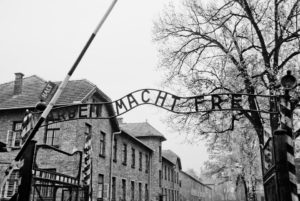
Check also:
- Auschwitz address
- Auschwitz room of hair
- Auschwitz shoes
- Auschwitz Shuttle – Auschwitz Museum to Kraków
- Best Auschwitz Tour from Krakow
- Cheap Tour to Salt Mine
- Cheap Auschwitz tour
- Opening hours of the Auschwitz-Birkenau Museum
- Auschwitz – online tickets
- Auschwitz Tour Packages
- Tickets to Auschwitz
- Warsaw: Full-day Tour to Krakow and Auschwitz by Train
- What to Expect During Your Visit of Auschwitz
Crazy history of the inscription at the entrance of Auschwitz death camp
On several occasions, the inscription has been the object of the unhealthy interest of visitors. As a result, in December 2009, the panel was stolen and cut into three parts.
In the same month, thanks to the intervention of polish services, it was successfully recovered and restored. After that, a replica of the inscription was hung over the camp gate. According to the police, the commissioner of the theft was a Swedish neo-Nazi.
Probably the thieves did not bother to answer the question about the symbolic value of the stolen pieces of metal. Something was stolen that was a silent witness to human suffering. A suffering that we, living now, cannot even imagine.
Frequently Asked Questions
What is the significance of the phrase ‘Arbeit macht frei’ on the Auschwitz gate?
‘Arbeit macht frei’ is a German phrase meaning “work sets you free” or “work makes you free.” It was placed on the entrance gate of the Auschwitz concentration camp, as well as several other Nazi camps.
The phrase was intended to be a cruel deception, as prisoners were forced to perform hard labour, often until their deaths, without the hope of freedom. The phrase aimed at instilling a sense of false hope and cooperation among prisoners.
How does the upside down B in ‘Arbeit macht frei’ affect its meaning?
The upside down B in ‘Arbeit macht frei’ is believed to be an act of defiance by a prisoner who was forced to create the inscription. It is a subtle but powerful symbol of resistance against Nazi cruelty and deception.
The inverted letter does not change the meaning of the phrase itself, but its presence serves as a reminder that, even in the darkest of times, acts of defiance and sabotage against oppressors remained possible.
What is the difference between Doderick macht frei and Arbeit macht frei?
‘Doderick macht frei’ is not a known or historically accurate German phrase. It seems to have been confused with the infamous phrase ‘Arbeit macht frei.’ The latter phrase, meaning “work sets you free,” was displayed on the gates of Auschwitz and other Nazi concentration camps, symbolizing the deceptive nature of the Nazi regime.
What happened when the Auschwitz gate was stolen?
In December 2009, the “Arbeit macht frei” sign was stolen from the Auschwitz gate. The theft received international attention and condemnation, as it was considered an act of desecration to the memory of Holocaust victims.
Subsequently, the Polish and Swedish police collaborated to recover the sign. It was found in three pieces, and the culprits were arrested. Since then, a replica of the sign has been installed at the entrance, while the original is preserved in the Auschwitz-Birkenau State Museum.
What is the meaning of ‘Doderick macht frei’ in Succession?
As mentioned earlier, ‘Doderick macht frei’ appears to be a mishearing or confusion with ‘Arbeit macht frei.’ In the context of the television show Succession, it is possible that the phrase was misused or misunderstood.
It is advisable to research the specific reference within the show to gain a better understanding of its intended meaning.
How does ‘Work sets you free’ relate to concentration camps?
The phrase ‘Work sets you free’ is the English translation of the German ‘Arbeit macht frei,’ which was displayed on the entrance gates of Auschwitz and several other Nazi concentration camps.
It falsely implied that prisoners could earn their freedom through hard work, when, in reality, they were subjected to forced labour, torture, and death. The installation of this deceptive phrase at concentration camps serves as a stark reminder of the cruelty and deception at the hands of the Nazi regime.
